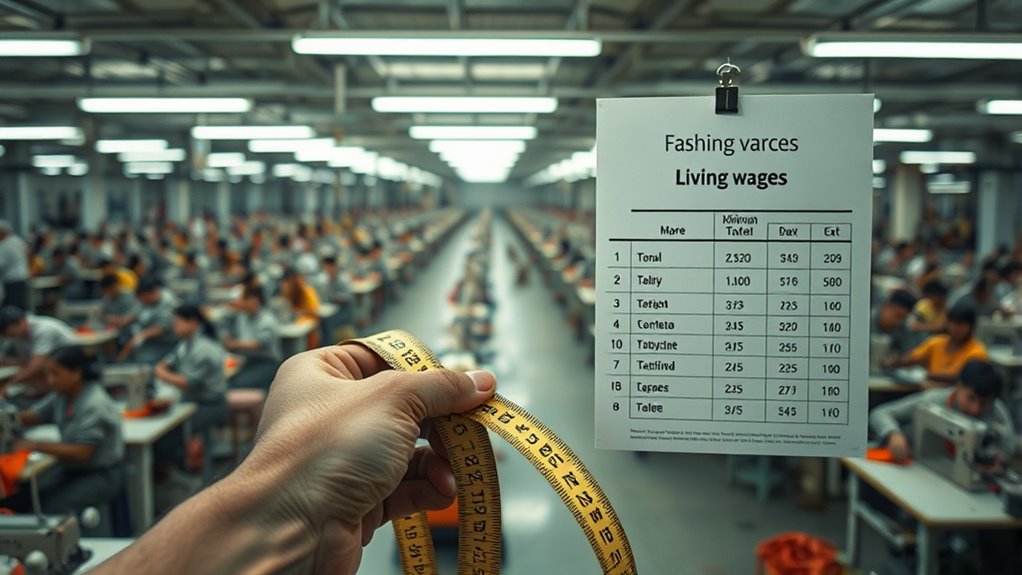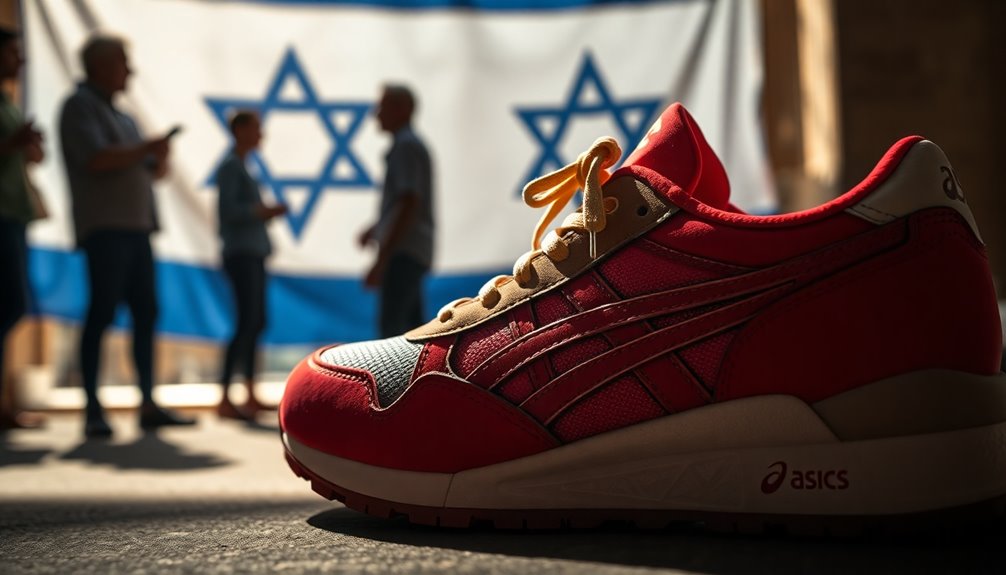In fashion, a minimum wage is the legally required lowest pay, often insufficient to cover basic needs, while a living wage ensures workers can afford essentials like food, housing, and healthcare. Paying a living wage supports ethical practices, improves workers’ quality of life, and boosts industry sustainability. If you want to understand how these wage differences impact supply chains and ethical standards, keep exploring the importance of fair wages in fashion.
Key Takeaways
- Minimum wage is the legally mandated lowest pay, often insufficient for basic living costs in fashion supply chains.
- Living wage covers essential expenses like housing, food, healthcare, ensuring fair compensation for fashion workers.
- Fashion brands paying a living wage promote ethical practices, worker well-being, and long-term supply chain sustainability.
- Many suppliers in the fashion industry pay only the minimum wage, risking worker hardship and regulatory issues.
- Advocating for a living wage enhances brand reputation and aligns with responsible sourcing and consumer expectations.

In the fashion industry, understanding the difference between a living wage and a minimum wage is vital, especially if you’re concerned about fair labor practices. As someone involved in sourcing or production, you need to recognize how wages impact workers throughout the supply chain. A minimum wage is the legally mandated lowest amount workers can be paid, but it often falls short of what’s necessary for a decent living. A living wage, on the other hand, is calculated based on the actual cost of living in a specific region, ensuring workers can afford essentials like food, housing, healthcare, and transportation. When companies prioritize paying a living wage, they promote fair labor practices that respect human dignity and promote long-term sustainability.
Additionally, paying a living wage can help mitigate risks related to regulatory compliance challenges, which are increasingly important as governments implement stricter labor laws. Your role in the supply chain means you’re directly connected to workers who produce the garments you sell or purchase. Many companies rely on complex global supply chains where wages can vary widely. Often, suppliers in developing countries pay workers only the minimum, which rarely covers their basic needs. This gap highlights how important it is to look beyond the price tags and consider the wages paid to those at the start of the process. Ensuring fair labor involves scrutinizing wages at every step, from raw material extraction to final assembly, and advocating for wages that meet or exceed a living wage standard. Doing so isn’t just ethical; it can also enhance your brand’s reputation and foster stronger relationships with responsible suppliers.
Paying a living wage can considerably improve workers’ lives, reducing poverty and enabling better health and education outcomes. When your supply chain upholds fair labor practices, it encourages a more stable workforce, fewer turnover issues, and higher-quality work. furthermore, transparent wage policies build trust among consumers increasingly concerned about ethical fashion. By advocating for wages that allow workers to meet their needs, you’re contributing to a more equitable industry. This effort also pressures other brands and suppliers to follow suit, creating a ripple effect that can lead to widespread change.
Understanding the importance of fair labor within your supply chain isn’t just about compliance; it’s about making a conscious choice to prioritize human well-being. Recognizing the distinction between a living wage and a minimum wage empowers you to push for fair pay practices. Ultimately, integrating fair labor standards into your sourcing decisions helps build a resilient, ethical fashion industry where workers are valued and compensated justly. This shift benefits everyone, from the workers who produce your garments to the consumers who wear them, cultivating a more responsible and sustainable fashion landscape.
Top picks for "wage minimum fashion"
Open Amazon search results for this keyword.
As an affiliate, we earn on qualifying purchases.
Frequently Asked Questions
How Do Living Wages Impact Global Fashion Supply Chains?
Living wages improve global fashion supply chains by encouraging wage transparency and supply chain transparency, which helps you identify and address unfair pay practices. When brands prioritize living wages, they push for better working conditions and fair compensation, fostering trust with consumers. This transparency reduces exploitation, promotes ethical sourcing, and strengthens supplier relationships. As a result, your supply chain becomes more sustainable, resilient, and aligned with ethical standards, benefiting everyone involved.
Are Consumers Willing to Pay More for Ethically Produced Fashion?
Yes, you are often willing to pay more for ethically produced fashion when you’re aware of the impact. Consumer awareness about ethical branding influences your purchasing decisions, encouraging brands to prioritize fair wages and sustainable practices. When companies highlight their commitment to ethical standards, it builds trust and makes you more inclined to support them financially. Ultimately, your willingness to pay more helps promote better working conditions in the fashion industry.
What Role Do Governments Play in Enforcing Fair Wages?
Think of governments as the referees in a game, ensuring fair play. They set labor laws and actively enforce wage regulations, making sure companies pay fair wages. Without strong oversight, it’s easy for rules to be broken, leaving workers underpaid. By monitoring wage enforcement and updating labor laws, governments help protect workers’ rights, creating a level playing field where fair wages aren’t just a goal but a standard everyone must follow.
How Does Wage Disparity Affect Worker Health and Safety?
Wage disparity increases worker stress, making it harder for you to focus on safety and increasing the risk of safety hazards. When wages are unequal, workers may cut corners or skip safety procedures to meet financial needs, risking injuries. You might also experience anxiety or burnout, which can impair your judgment and awareness, further compromising health and safety in the workplace. Addressing wage gaps helps improve overall worker well-being and safety standards.
Can Certification Programs Effectively Ensure Fair Wages in Fashion?
Like a trusty compass in uncharted waters, certification programs can guide you towards fair wages in fashion, but they aren’t foolproof. Their effectiveness depends on strictness and transparency. You should know that while certifications can promote wage enforcement and ethical standards, gaps remain if oversight falters. Ultimately, you need vigilant monitoring and buyer support to truly guarantee fair wages, turning the promise of certification into real change.
Conclusion
Now that you see the stark differences, it’s clear that choosing a living wage over minimum wage isn’t just a decision, it’s a declaration. By supporting fair pay, you spark change, soften seams of inequality, and sew solidarity into the fabric of fashion. Every action you take threads hope and honesty into the industry’s tapestry, transforming trembling textiles into a tapestry of trust. Together, you can craft a future where fairness fabrics every fiber of fashion’s future.










